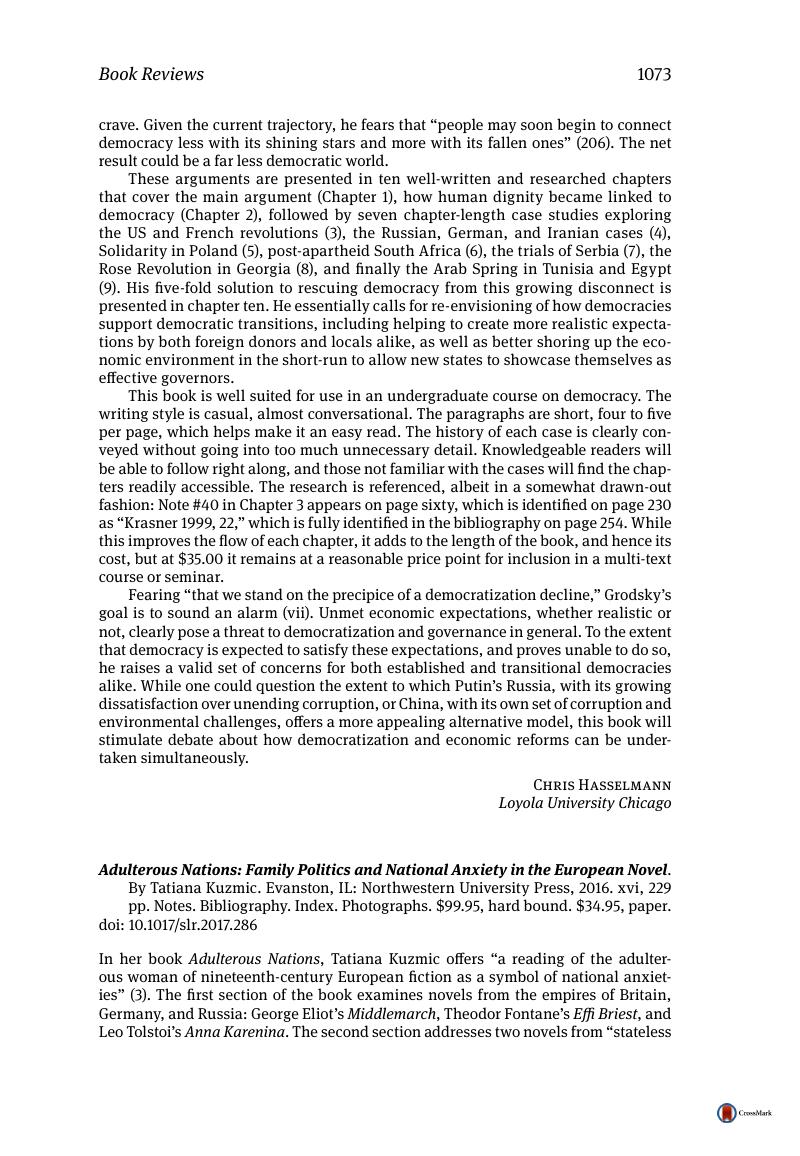In her book Adulterous Nations, Tatiana Kuzmic offers “a reading of the adulterous woman of nineteenth-century European fiction as a symbol of national anxieties” (3). The first section of the book examines novels from the empires of Britain, Germany, and Russia: George Eliot's Middlemarch, Theodor Fontane's Effi Briest, and Leo Tolstoi's Anna Karenina. The second section addresses two novels from “stateless nations,” August Šenoa's (Croatian) The Goldsmith's Gold and Henryk Sienkiewicz's (Polish) Quo Vadis. Each group of novels reflects its own logic of imperial or national anxiety: in the first section, the actual or potential adultery involves a married woman and a male seducer who is also a national outsider. With an eye on the Slavic element in these works, Kuzmic notes that in both Middlemarch and Effi Briest this interloper is a Pole, or at least part Polish and thus out of place in a closed and inbred setting. Of course, there is no adultery in Middlemarch, though the sympathy between the potentially adulterous couple leads the dying husband to specify in his will that his widow shall forfeit her inheritance if she marries that man. Suggestions made by characters in the book that Ladislaw is actually Jewish (especially because Eliot's next hero, Daniel Deronda, is a Jew) seem to heighten some critics'—and readers'—reluctance to like a character who is actually three-quarters English. In Anna Karenina, Kuzmic argues that Aleksei Vronsky is just as much a foreigner, a fully-westernized specimen whose horse even has a silly French name. The imperial ambitions of the countries where these novels are set give the adultery plot broader political resonance, and Kuzmic finely outlines the place of the chosen novels in the political and military situation of the time, as well as amid the authors' own works. She ties the skepticism over the Balkan wars evinced by Levin and old Shcherbatsky in the end of Anna Karenina to Tolstoi's own growing pacifism, noting that in its first, serial publication this classic of Russian literature was censored: the epilogue was cut so as not to offend public enthusiasm for military support for the “brother Slavs” in the Balkans. Interestingly, it is the more “Slavophile” characters who wish to stay home and cultivate their gardens, while more “Westernized” characters in the novel speak in favor of intervention.
The book's second section involves novels from subjugated nations: Croatia, which in the nineteenth century was part of the Austro-Hungarian Empire, and Poland, partitioned among three local empires, the Austrian, German, and Russian. Here the would-be adulterer is a woman married to a figure with power in the empire, who tries to tempt the upstanding young man away from his nationally-appropriate true love. My reader may already be thinking that these novels are much less well-known than those from major languages, although Sienkiewicz won the Nobel Prize in Literature, and Quo Vadis? was considered his greatest work. Šenoa's Goldsmith's Gold relies on meticulously researched history, with attention to class differences: an upper-class Croatian man loves the daughter of a goldsmith, a prosperous kind of craftsmen, but a craftsman nonetheless. The evil woman who desires him has the girl poisoned, and a few pages at the end of the chapter find a similar (though not adulterous) plot in a Serbian story where the young hero studying abroad is undone by love for a German woman. Sienkiewicz's Quo Vadis? is set in imperial Rome in the era of Nero and (like Middlemarch) has a happy ending, as the heroine converts her lover to Christianity. Kuzmic usefully compares Polish Messianism (focused on Christ) to Russian preference for God's Mother in its religiously-tinged imperial ambitions.
The economy of discourse in which national issues are symbolized by a human body or by the family is richly fleshed out by this study. Gender is a central feature, as women are tied to their nations' image whether they are tempted to stray or are involved with men who are tempted themselves to be untrue to the nation women represent or embody. Specialists in comparative literature or in any of the five national literatures treated—British, German, Russian, Croatian or Polish—will find the book valuable, and any curious lover of literature will be broadened and enlightened by reading Tatiana Kuzmic's Adulterous Nations.





